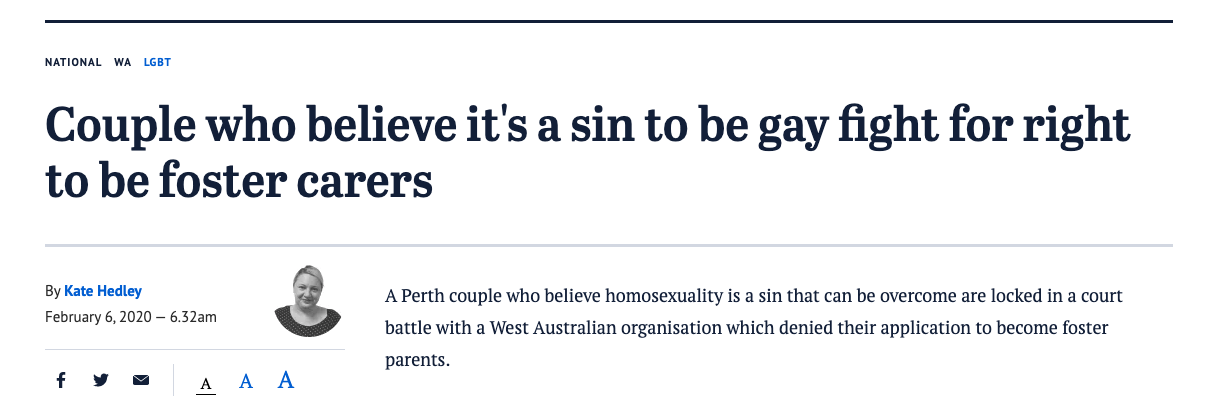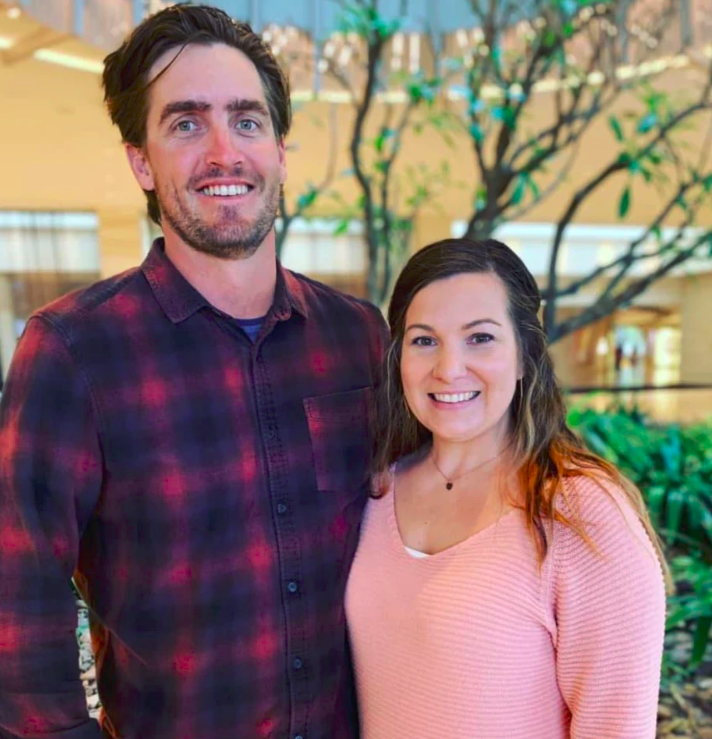February 6, 2020
Christians: Do your beliefs make you unsafe to be foster parents?

So what would you say as a traditional Christian couple when (not if) the foster care agency asks your response to a foster child announcing they identified as LGBTQI?
Leaving aside the vexing question of what age any child could make such a declaration meaningfully, this exact issue has led to a Western Australian couple being locked in a court battle with a foster care agency.
Wanslea Family Services culled Byron and Keira Hordyk from their foster process after labelling the couple’s response to the question as “unsafe”. This is despite receiving the couple receiving an initial positive report.
Of course it’s the follow up questions that foster agencies need to ask. And rightly so. They need to get to the real nub of things. I’ve been asked heaps of questions by foster agencies for couples, and it’s a good thing.
After all, it would be a disaster to take a child from a neglectful home or an abusive home – whether physically, emotionally or sexually – and place them in one that is equally dangerous.
Which is clearly what Wanslea considers the Hordyk’s home to be. Dangerous. Unsafe.

Which is astonishing. Our foster agencies in Australia are under extreme pressure with many foster children either having no place to go to, or indeed being placed in (I have been reliably told this), homes that are already unsafe, both sexually and physically. It’s any port in a storm these days as the family breakdowns and implosions fuelled by the Sexular Culture take their toll.
Yet here is a couple with children of their own who don’t tick that crucial LGBTQI box. And that makes them unsafe. Too unsafe despite the wretchedly unsafe conditions many children are already facing.
Though what did they actually say? Here’s the report:
The Hordyks told the organisation they would love and care for any child in the same way they loved and cared for their own children, but that they believed identification as LGBTQI was a sin that could be resisted, and they would try to help the child overcome the sin.
That was the smoking gun. The report determined that the family failed to meet one of the five competencies that the Department of Communities specifies for foster carers, that of “providing a safe living environment.”
The Hordyk’s now claim Wanslea discriminated against them on the grounds of their religious conviction.
As the Sydney Morning Herald reports:
The Hordyks contend Wanslea could have disqualified them from caring for LGBTQI-identifying children, but approved them as foster carers for any other child.
Though you can’t be too careful can you? Wanslea certainly thinks you can’t.
The question must be asked of course, since Wanslea (and the department?) is convinced that the Hordyks cannot provide a safe living for a foster child, what chance them providing a safe home even for their own children?
Maybe the Hordyks offspring should be candidiates for foster care themselves? After all it sounds like the Hordyks would love and care for their own children the same way they would for a foster child. And since that way is now deemed unsafe for a foster child, then what for their own children?
Surely the department cannot overlook this potential danger! Surely that hotbed of religious fundamentalism formerly known as the traditional Christian family home should be off limits for all children, gay, straight or whatever?
It would be completely crazy to think that any democratic Western government would ever try try that one on, isn’t it? (watch this space).
To all of this I want to add this caveat: Part of the foster process is that you won’t be bringing those children up like you bring up your own child. They are wards of the state that you are looking after, you are not adopting them.
As a friend told me, (who is a foster parent and who hold similar views on sexuality as the Hordyks, and who was also quizzed about this), there is a marked difference between caring for someone else’s child and caring for your own. If a child was Buddhist in your care it would be a good idea to allow them to attend temple if they so desired. It’s a very fine line to walk.
The devil is in the detail. And will come out in the hearing. Did Wanslea believe that the Hordyks were viewing the opportunity to foster as one in which they were going to shape a child towards their worldview? If so that would have sent up a red flag.
Could the Hordyks have done anything differently? Hard to say. It could come down to how a case worker evaluated the way they answered that question – and the follow up questions.
I guess they could have lied to get through the process. But then again that’s not on either. That would make them a less-than-adequate foster family. Besides, lie upon lie is often the bedrock of toxic family life. Truth sets us free.
And it’s certainly worth considering the difference between a young foster child, who perhaps has already been through the emotional, physical and sexual wringer announcing themselves to be LGBTQI, and that same child engaging in sexual practices.
Does Wanslea think that’s up for grabs when it asks that question? One would hope not. Can Wanslea distinguish between proclivities and practices? Should the Hordyks have had that in mind too when answering the question?
Should they have answered more carefully, and delineated the difference between the values they wish to instil in their children, and the general care they would provide for a ward of the state? These are complex matters.
If you are fostering a child then you’d have to be careful to keep some boundaries around that child’s personal choices and declarations. After all they may have ended up with you because some boundaries have been crossed already. There’s going to be some sort of brokenness (if I’m still allowed to say that). The children you foster have to muck in with your life and values, but in the end you will be handing them back, and hopefully in better shape than they were in when they arrived with you.
Putting it crassly, it sounds like there’s good money to be had for a savvy Christian consultant who can successfully coach Christian couples through the foster process in a post-Christian world. Or at least speak to those who are already fostering who hold the same values and framework about sexuality. After all it seems the need for fostering is too great to fall at this first hurdle through an inexperienced answer.
We need to learn the Daniel-esque art of cultural negotiation in this Babylon of ours. No need to cast our pearls before swine. And increasingly we’re going to have to be much smarter in our responses, and more incisive in our pushback. Let over-zealous and ideological government agencies hang themselves in their own rope.
But still, it’s intriguing and worrying. It’s clear that in our Sexular Age, the LGBTQI issues are the shibboleth. Your response to them determines which side of Safe/Unsafe you are on.
Though, there’s some light among all the heat, with news this week that the Queensland branch of the Australian Medical Association is calling for more circumspect (aka scientific) responses to the huge surge in claims by young people that they are transgender.
There’s an almost slavish insistence by groups such the Australian Psychological Association that the only safe pathway is full affirmation, with the Queensland Government meekly followed suit late last year in announcing a blanket ban on conversion therapy.
As The Australian newspaper reports:
[Queensland AMA] Branch president Dilip Dhupelia said the government’s claim there was clear evidence of conversion therapy taking place was “far from the truth”, and in any case new treatment guidelines for gender dysphoric youth “would eliminate any non-therapeutic practices … overnight”.
A fine state of affairs when a foster agency declares a Christian home unsafe for a child in need, while in Queensland the state government cheerfully cuts the safety net under hundreds of children, allowing them to tumble into the gleeful laps of activists and ideologues.
Written by
There is no guarantee that Jesus will return in our desired timeframe. Yet we have no reason to be anxious, because even if the timeframe is not guaranteed, the outcome is! We don’t have to waste energy being anxious; we can put it to better use.
Stephen McAlpine – futureproof
Stay in the know
Receive content updates, new blog articles and upcoming events all to your inbox.


